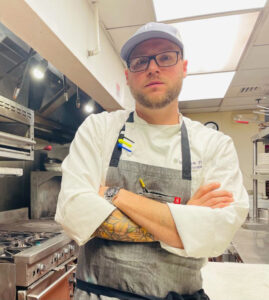
Matthew Blazey, Executive Chef of Camargo Club (Cincinnati, Ohio)
The culinary industry is often portrayed as fun, exciting, creative—with a focus on the glitz of creating delicious and beautiful food. When the passion runs deep, like it does for me and many others, this part is true. But it’s not the full picture. I believe it’s important to provide prospective chefs a transparent view of what this role really looks like.
Creating, developing and plating the best possible food is the best part of the gig. But what about the areas we don’t talk enough about?
When I see a young chef struggle, I can almost guarantee it’s due to one of two things: managing people or managing financials.
Managing People
One of the best pieces of advice I’ve heard is from Chef Aaron Hagerdorn, and it’s what I tell sous chefs and executive sous chefs: When running a kitchen, treat it as if you own that kitchen or restaurant.
This encourages us to look at the operation through a different lense. Imagine you were writing payroll checks out of an account in your name. How long would you allow an associate to constantly be late? How long would you allow a sous chef to berate a cook?
I like to be as transparent as possible about my expectations for managing our team. The first time you witness this sous chef’s behavior, there should be an initial coaching session. Chances are, it’s how they were ‘brought up.’ I try to relate to the chef but also make it clear that this method is for the birds.
No one likes confrontation, but confrontation is unavoidable. Executive chefs need to know how to manage our teams in a manner that supports what we’re preaching and yields the best results.
I’ve adopted what I call a situational management style. For example, if I have two grill cooks, one who’s been working grill for 20 years, and the other who’s stepping into the position for the first time, and they both make the same mistake, I’ll approach these two conversations differently. For the seasoned grill cook, I might be more direct. But the new cook might need to be approached with a more delicate hand. There’s a good chance the new grill cook simply lacks understanding or confidence; if I approach both situations in the same manor, I risk them getting fed up and leaving.
Prospective chefs must understand that cooking is only part of the job. A large and incredibly important part of a chef’s routine is managing people.
Managing Money
The concept of treating your kitchen as if you own it is even more fundamental with regards to finances.
As executive chefs within private clubs, we often have the padding of a much higher-budgeted food cost. But young chefs should be careful not to confuse this with being able to order, procure and make whatever you want without financial burden. We still have to operate within our means. It’s not about individual departments, but the club as a whole; if your club is using a higher percentage to subsidize your high cost, this takes away from the greater good.
Also, some clubs operate with the industry-standard COS, which can be much lower. This means you have to constantly monitor waste and adapt to fluctuations in pricing and volume of prep—and deal the added pressure.
When I was appointed to my first executive chef position, this was a difficult part of the job to both manage and understand. It means spending time to do things correctly and creating your own methods to efficiently tackle this aspect of the job. I’ll be the first to admit: I still pick the brains of my controllers and CFOs. I’d rather face the ‘shame’ of asking a question than get called out in a board meeting for being the only department head with a poor monthly financial statement.
If you’re a young chef, eager to take the reins, start learning now. Ask your superior to get involved in inventory, costing and anything that affects your finances because often, when you take your first executive chef gig, the expectation is that you already know what to do.
Put the time in and assert yourself in areas of opportunity. Treat your teams with transparency and thoroughness. Show your club that they made the right decision in hiring you as executive chef—and treat the operation as if it were your own.




